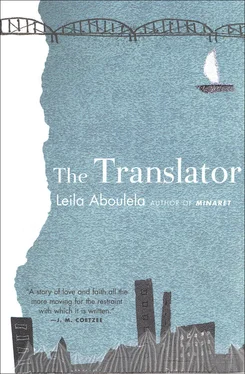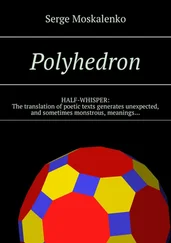There was still the remains of a holiday atmosphere, the Christmas lights not yet taken down. No schoolchildren, no lollipop ladies, the term had not yet begun. Sammar knew that when she got to the university it would be quiet and dull with the students still away until next week. She would walk the corridors of the buildings meeting only other staff or the odd postgraduate student. The lecture rooms would be dark and silent, the library without its usual liveliness. She would meet Rae and he would not be as busy as he was during term time. She would ask him about his cold, his cough had sounded worse the last time they spoke. He would show her the University of Azhar thesis that he wanted her to start working on, she would give him the book on the Qudsi Hadiths, and there would still be time. Maybe they could talk like they had talked on the telephone, she saying what she had always wanted to say and he not surprised. Listening to her and then talking about places and people she could never have known, making her feel that she could understand them, that she was connected to his stories in some way. Maybe they could talk in his office like they had talked on the telephone. She had not counted the times he had called her over the holidays, nor measured their conversations in minutes and hours. She had stopped herself from doing that. And she had stopped herself from asking, why is he calling me, what is going to happen, what does all this mean?
The shops were beginning to open their doors. Sammar passed a newsagent, a sports shop, fishmonger, bakery. The grocer shop which sold halal meat was closed; it opened late in the day. Sometimes on her way home, she stopped there. While the Bengali owner of the shop cut up the chicken at the back, she would stand waiting near the counter, the small dingy space cramped with sacks of dried vegetables, tins from faraway places, around her the smell of spices and Asian film stars on the walls. She bought chili sauce and tins of beans, the ingredients written out in Arabic, packed in a warm place on another continent. A packet of mix for falafel, made in Alexandria.
She walked past a shoe shop, a shop selling wedding dresses and lingerie. Winter bargains, the January Sale, big red signs, half-price, 30 per cent off, Biggest Ever Sale. Yesterday, she had been one of the people in search of bargains. Yesterday had been a busy day. In the morning when she woke, she had looked with clear eyes at her room, the hospital room. She had seen the ugly curtains, the faded bedspread. She opened cupboard and drawers to find tired elastic, wornout nylon and scruffy shoes with eroded heels. She held these things in her hands, as if seeing them for the first time. Frayed wools, discoloured cottons, and even her scarves, the silks for her hair which she had always chosen with care were now dull and threadbare. Since Tarig died she had not bought anything new. She had not noticed time moving past, the years eroding the clothes Tarig had seen her in, wools he had touched, colours he had given his opinion on.
The kitchenette in the corner of the room held a small fridge, the electric ring, the table she used as a desk. There she saw the mouldy bread, cheese with fur and green, salad that had grown dark and heavy, past its sell-by date. Things did not have a smell in this part of the world. If she had been back home, she would not have been able to be neglectful for so long and the ants and the cockroaches would not have left her in peace. Here, an onion had grown a long green stalk. A chicken leg, three months old, sat in the fridge like rubber. Only the ancient cucumber oozed a puddle of toffee-like substance, but it still did not have a smell. For years, Sammar had eaten such food, hacking away at the good bits and not questioned what she was doing, as if there were a fog blocking her vision, a dreamy heaviness everywhere. Now she looked around the hospital room and said to herself, ‘I am not like this. I am better than this.’
Big black bags, putting things away, folding and putting things away in a bag. Like when Tarig died and she had stripped everything away, mistakenly thinking she was never coming back to Aberdeen. But now there was no grief, no burning in her head and chest, she worked calmly, decided what she wanted to keep and what she didn’t. It did not take long. It was easy. She then cleaned everything, the floors and the walls, the windows and the fridge, the cupboard, the drawers. She made everything smell of soap and opened the windows to rinse her life with the freezing rain. She pulled the curtain down and took the pillow and the blanket to the launderette.
It was strange to walk into the big department stores, their bright lights and the smell of perfume, crowds of people in search of bargains. She was pleased that the shops were crowded. Quiet shops where the attendants had the time to say ‘Can I help you?’ made her nervous. When she bought the coat, she had a choice between different styles and colours. One coat which suited her when she tried it on, had golden buttons, their colour and cool touch a reminder of her aunt. In the dressing room with the mirrors behind her and in front of her, too many reflections of herself, she missed her aunt, suddenly and painfully, wished that they were together, that she could hug her again, that they could be close again, friends, like in the years before Tarig died. But Sammar did not buy the coat with the golden buttons though she knew her aunt would have preferred it and her aunt’s taste in clothes had always been the ideal, the guidance. She bought the duffle coat with the toggles and the smooth brown stones instead of buttons. After she paid for it and left the shop, she lifted it out of the large plastic bag with the red letters SALE and put it on straightaway, tearing off the price tags, stuffing her old coat in its place.
‘You have lovely skin,’ said the bright lady behind the cosmetics counter. She had a lot of mascara on very few eyelashes. She tapped the jars and the bottles of lotions with her long fuchsia nails.
‘Oh… thank you.’
‘You won’t need these,’ the lady continued and her delicate hand hovered over lotions and creams in purple containers. ‘This one,’ and she picked up a bottle of yellow lotion. ‘Try it.’
Sammar tipped the bottle and rubbed a little of the lotion on the back of her hand.
‘Do you wear make-up?’
‘No… I used to…’
‘Because if you buy the moisturiser, the soap and the toner, you get a gift set with lipstick, blusher, eyeliner and eye shadow. It’s a special offer.’ The fuchsia nails pointed to a sign that stood on the counter: ‘Special Offer’ written in red and a picture of the gift set looking bigger than it was in real life.
Sammar had not worn make-up or perfume since Tarig died four years ago. Four months and ten days, was the sharia’s mourning period for a widow, the time that was for her alone, time that must pass before she could get married again, beautify herself again. Four months and ten days. Sammar thought, as she often thought, of the four months and ten days, such a specifically laid out time, not too short and not too long. She thought of how Allah’s sharia was kinder and more balanced than the rules people set up for themselves.
She bought new curtains for her room. When she hung them up, they changed the room, changed the light in it. It was now no longer a hospital room with the coloured plastic bags and packaging scattered on the floor, her new scarves laid out on the bed. Then, looking at the curtains, their bright pattern of orange, blue and brown, she realised that they were like the curtains Rae had described to her, the curtains that had been in his old house overlooking the Dee. She had unconsciously chosen these colours, the same colours he had talked about. His words were in her mind now, floating, not evaporating away. At night she dreamt no longer of the past but of the rain and grey colours of his city. She dreamt of the present. She dreamt of Lesley saying that the telephone in the hall did not work anymore. She dreamt that she, and not Amelia, was the one who was carrying the dead, disfigured baby. He was heavy inside her and she wanted to push him out. But her aunt was there in the dream saying, you are not due yet, it is still not time to give birth. Her aunt did not know that the baby was dead, only Sammar knew because Rae had told her. She wasn’t sad, she felt the baby’s heaviness dragging down and the pain was familiar, not frightening, not unpleasant. She knew that her aunt was wrong, that it was time now and she would not be able to stop herself from pushing the baby out.
Читать дальше












